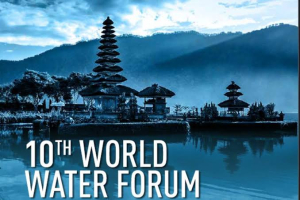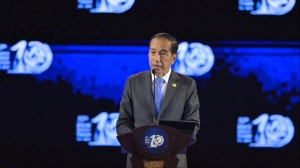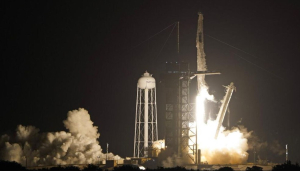Elon Musk: Solar power plants, key to solving global water crisis
Elon Musk, the owner and CEO of Tesla Inc. and SpaceX, highlighted the potential of solar power plants (PLTS) as a solution to the global water crisis during his address at the opening of the 10th World Water Forum in Nusa Dua, Bali.
He emphasized that while more research is needed, solar power could offer a cost-effective and efficient means of desalinating seawater to provide clean water.
“We are making breakthroughs in desalination efficiency. I believe we are on the cusp of a promising future for water and sustainable energy,” Musk said on Monday.
He cited that desalination, the process of removing salt from seawater to make it drinkable, has traditionally been energy-intensive and expensive. However, utilizing solar energy could make the process much more affordable.
Musk pointed out that solar power plants can generate approximately one gigawatt (GW) per square kilometer per day from sunlight, significantly boosting energy supply for desalination.
“Although the sun doesn't shine all the time, the energy captured per square kilometer per day is substantial,” he said.
He also suggested that harnessing solar energy from the Sahara Desert alone could potentially supply electricity to the entire European continent, underscoring the vast and often underestimated potential of solar power.
President Joko Widodo (Jokowi) echoed Musk’s sentiments on the critical importance of water management. In his opening remarks at the forum, Jokowi stressed the need for global collaboration to ensure sustainable water management.
He warned that without proper management, up to 500 million small-scale farmers worldwide could face severe drought by 2050, jeopardizing 80 percent of the global food supply.
"Only 1 percent of the Earth's water is accessible for drinking and sanitation despite covering 72 percent of the surface. Effective water management is crucial as every drop is invaluable," Jokowi asserted.
Jokowi also highlighted Indonesia’s significant water resources and local wisdom in water management, pointing out that 65 percent of the country's area is water.
He emphasized that the theme of the 10th World Water Forum, "Water for Shared Prosperity," revolves around three core principles: avoiding competition, promoting equity and inclusive cooperation, and supporting peace and shared prosperity.
“These principles can only be achieved through one key word − collaboration,” Jokowi concluded.
Tag
Already have an account? Sign In
-
Start reading
Freemium
-
Monthly Subscription
30% OFF$26.03
$37.19/MonthCancel anytime
This offer is open to all new subscribers!
Subscribe now -
Yearly Subscription
33% OFF$228.13
$340.5/YearCancel anytime
This offer is open to all new subscribers!
Subscribe now






